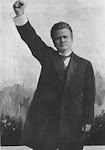They explained why in a letter to the editor of the local newspaper, who, as is the norm for the corporate media, got the facts wrong:
To the editor of THE EAGLE:I applaud the teachers for their strong stand in solidarity and professionalism. Their students are lucky to have such high quality teachers.
While we appreciate the article "Investing in students' futures" (Eagle, Dec. 3), we would like to make some clarifications.
The $8,700 that the Lee Middle and High School A.P. teachers gave to the school is not from "grant pay," but rather "merit pay," earned as a result of high student scores on last spring's A.P. exams. Unfortunately, the acceptance of "merit pay" was a non-negotiable requirement imposed by MMSI as part of the grant. We accepted these terms only for the additional benefit that a strong and varied A.P. program would provide for our students -- "merit pay" was not an incentive to us. By refusing to accept this money and instead returning it to the school, we found a way to make it more palatable.
As a union, we strongly oppose "merit pay" on both philosophical and ethical grounds. First, the notion of "merit pay" suggests that high achieving students are more worthy of a teacher's time and effort than average achieving students or those who struggle. Refusing to accept the "merit pay" has allowed us to put the money back into our departments to enhance the learning of all our students. We will buy much-needed items, such as supplies, textbooks, and technology, and also fund field trips and SAT preparation classes for students lacking the means to pay for them themselves.
Second, "merit pay" for certain teachers of certain students in certain classes is inequitable to professional educators. In our view, it is a way to undermine union efforts to ensure fair and equal pay for equal work, education, and experience. Before students arrive in an A.P. class in 11th or 12th grade, they have already been in school for at least 10 years. It is faulty logic to assume that the efforts of one A.P. teacher were the only cause of high scores. Earlier teachers, parents, and community members all help contribute to the success of our students.
Merit pay is an insult to our professionalism and a divisive tool designed to incite dissension among us in hopes of weakening our union, which is not only a political organization, but also a professional one, intended to protect the interests of both educators and students.
The LEA was pleased to find a way to bring high-quality, college-level curriculum to our students while holding on to non-negotiables of our own.
JANE MCEVOY
Lee
Jane McEvoy is A.P. Language and Composition, English Department Chair and LEA Vice President. The letter was also signed by Robert Hungate, A.P. Biology, Science Department Chair, Mary Verdi, A.P. Literature and Composition, Thomas McCormack, A.P. Statistics, and Pamela Briggs, A.P. Calculus.
I would encourage the gentle reader to reflect on this story and think about what Scott Walker and the Teapublicans have done to our state with Act 10 and substituting it with their own version of merit pay, not only in the schools, but in all aspects of public service.
Keep in mind that unlike Massachusetts, in Wisconsin, merit pay is just another way of saying cronyism.














Outstanding.
ReplyDeleteI work for Wisconsin. We just had the second go around of merit payments. My observation is that the merit system is divisive, and causing many hard feelings.
ReplyDelete